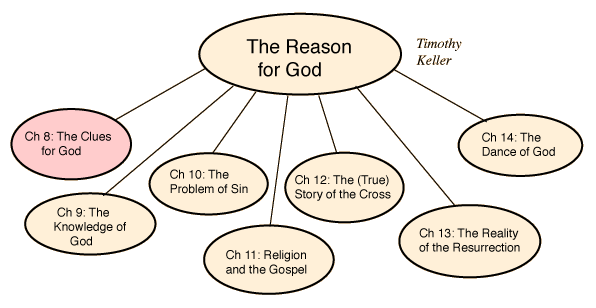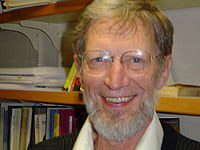The Reason for God
Timothy Keller
Chapter 8: The Clues for God
 Romans 1:19-20, Psalm 19:1-4 Psalm 8:1-6
Romans 1:19-20, Psalm 19:1-4 Psalm 8:1-6
- There is no irrefutable proof of God's existence, but many people have found strong clues for his reality in many places
| Philosopher Alvin Plantinga believes there are two to three dozen very good arguments. |  |
| Keller traces a small selection of these arguments. Atlanta's William Lane Craig has written persuasively about the Kalam Cosmological Argument. |  |
- The Mysterious Bang - or why is there something rather than nothing?
- The scientific community is united (as united as it gets) in the belief that the universe is contingent - that it had a cause outside itself.
- Skeptics reply that just needing a cause doesn't get us to the God of the Bible.
- True, but the clue here is that something besides the material world does exist.
- The Cosmic Welcome Mat
- This is the "Anthropic Principle," that the constants of the physical world appear to be "fine tuned" to allow for life.
- Speed of light, nuclear forces, gravitational and cosmological constants,
- The most common rejoinder is that there may be trillions of universes and we are of course only seeing the one where these conditions prevail.
- There is, of course, not a shred of evidence for any other universes.
- This is a perfect example of rejection of evidence (or lack thereof) to preserve a philosophical assumption.
- Remember the story of the man and the firing squad that all missed!
- The Regularity of Nature
- Science cannot prove the continued regularity of nature - it can only take it on faith!
- [In fact, we cannot prove that mathematics works!]
- It is increasingly understood that modern science arose, not out of freeing people from the oppression of the church's unscientific positions, but from religious people who believed that God created and sustained an orderly universe.
- The list of believing scientists at the inception of the "modern" era is truly impressive.
- The Clue of Beauty
- In the presence of great art, or even great natural beauty, we have the inescapable feeling that there is more to the world than its physical reality.
- This is true even if we admit that we can measure physiological responses to such scenes on our instruments.
- But it is more than feeling. We feel a NEED for this feeling.
- As far back as St. Augustine, this felt need was seen as a clue to God's existence.
- With every other need we feel, there exists something to satisfy it.
- So how do we understand the need for meaning and beauty? Is it God?
- Interestingly though many people reject the cartoon version of heaven (angels playing harps on clouds), what the Bible promises is a renewed earth and renewed bodies. Who wouldn't want to live on a perfected earth?
- The Clue Killer
- Of late an "explanation" has arisen that claims to answer all these so-called clues.
- It's evolutionary biology - that everything can be explained through natural selection.
- See Daniel Dennett's Breaking the Spell: Religion as a Natural Phenomenon.
- The key claim is that belief in God is hardwired into our physiology because it was directly or indirectly associated with traits that helped our ancestors adapt to their environment.
- But many believe not only that this argument contains a fatal contradiction, but that it actually points to another clue for God!
- Evolution can only be trusted to give us cognitive faculties that help us live on, not to provide ones that give us an accurate and true picture of the world around us.
- But if our cognitive faculties only tell us what we need to know to survive, not what is true, why trust them about anything at all?
- The famous Darwin's Doubt says: if man's mind is risen from the lower animals, how is it that we can trust it?
- So evolutionary science tries to have it both ways.
- They apply their skepticism to our beliefs about God, but exempt their belief in evolutionary science!
- The power of reason is based on its independence of the physical world.
- The Clue Killer as a Clue
- If the clue killer is true, we have no explanation for all the clues we have looked at so far.
- We cannot trust what our cognitive faculties tell us about physical origins, regularity, beauty and meaning.
- But if God exists, we have a basis for all of these experiences.
- Keller sums this up as follows:
- Though the secular view of the world is rationally possible, it doesn't make as much sense of all these things as the view that God exists. That's why we call them clues. The theory that there is a God who made the world accounts for the evidence we see better than the theory that there is no God. Those who argue against the existence of God go right on using induction, language, and their cognitive faculties, all of which make far more sense in a universe in which a God has created and supports them all by his power.
- Beyond the Clues
- If you think all this has simply resulted in our believing that, on the whole, God exists, we need to take this a step further.
- Keller next sets out to demonstrate that you know that God exists regardless of what you profess.
- Even if we believe with all out minds that life is meaningless, we simply can't live that way. We know better.
|
Index |


